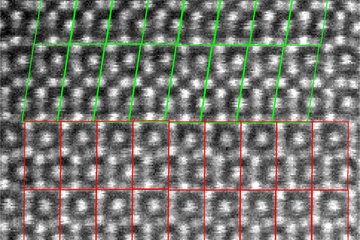All genres
641.
Talk
Evolution of faceted voids and fingering instabilities in a model thin film system - Insights by in-situ environmental scanning electron microscopy. Symposium - In situ Microscopy with Electrons, X‐rays and Scanning Probes, Universität Erlangen‐Nürnberg, Erlangen, Germany (2017)
642.
Talk
Using simulations to investigate the apparent fracture toughness of microcantilevers. Nanomechanical Testing in Materials Research and Development VI, Dubrovnik, Croatia (2017)
643.
Talk
Ag segregation induced nanofaceting of an asymmetric tilt grain boundary in copper. MS&T17, Materials Science & Technology, Pittsburgh, PA, USA (2017)
644.
Talk
Setup of a microscale high temperature loading rig for micro-fracture mechanics. Euromat 2017, Thessaloniki, Greece (2017)
645.
Talk
In-situ electron microscopy: Insights in solid state dewetting of epitaxial Al thin films on sapphire. 13th Multinational Congress on Microscopy, Rovinj, Croatia (2017)
646.
Talk
In-situ electron microscopy: Insights in solid state dewetting of epitaxial Al thin films on sapphire. Microscopy Conference 2017 – Dreiländertagung (MC 2017), Lausanne, Switzerland (2017)
647.
Talk
Atomic structure of a novel hard coating – transmission electron microscopy study of Mo2BC. Microscopy Conference 2017, Lausanne, Switzerland (2017)
648.
Talk
In situ small scale fracture experiments. RQ16, Microstructural Kinetics Group, Department of Materials Science & Metallurgy, Leoben, Austria (2017)
649.
Talk
Sulfur-induced embrittlement of copper. Microscopy congress 2017 – Dreiländertagung (MC 2017), Lausanne, Switzerland (2017)
650.
Talk
In-situ TEM Study of Mechanical Size Effects in TiC Strengthened Steels. Microscopy & Microanalysis 2017, St. Louis, MO, USA (2017)
651.
Talk
Resolving the mechanical performance of materials in microelectronic components with µm spatial resolution. FIMPART - Frontiers in Materials Processing Applications, Research and Technology, Bordeaux, France (2017)
652.
Talk
Multiprobe and Multiscale Characterisation of complex Materials. Fraunhofer Conference ‘The Future of Materials – Materials Future‘, Halle, Germany (2017)
653.
Talk
Structure and Micro-/Nanomechanics of Materials. DLR Cologne, Köln, Germany (2017)
654.
Talk
Hydrogen Embrittlement on Tungsten using Deuterium Plasma Charging and Microscale Fracture Experiments. GDRi Mecano General Meeting, Toulouse, France (2017)
655.
Talk
In-situ nanoindentation of hydrogen bcc Fe–Cr charged surfaces: Current status and future perspectives. Frontiters in Material Science & Engineering workshop: Hydrogen Interaction in Metals, Max-Planck Institut für Eisenforschung, Düsseldorf, Germany (2017)
656.
Talk
Severe Microscale Deformation of Pearlite and Cementite. 2017 MRS Spring Meeting & Exhibits, Phoenix, AZ, USA (2017)
657.
Talk
Fracture Toughness of Hexagonal and Cubic NbCo2 Laves Phases. Nanobrücken 2017, European Nanomechanical Testing Conference, University of Manchester, Manchester, UK (2017)
658.
Talk
A Brief History of Metals. Public Named Max Planck Lecture, MPIE Düsseldorf, Düsseldorf, Germany (2017)
659.
Talk
Towards understanding fracture experiments at the microscale. DPG Frühjahrstagung 2017, Dresden, Germany (2017)
660.
Talk
Hydrogen Embrittlement on Tungsten using Deuterium Plasma Charging and Microscale Fracture Experiments. DPG-Frühjahrstagung 2017, Dresden, Germany (2017)











